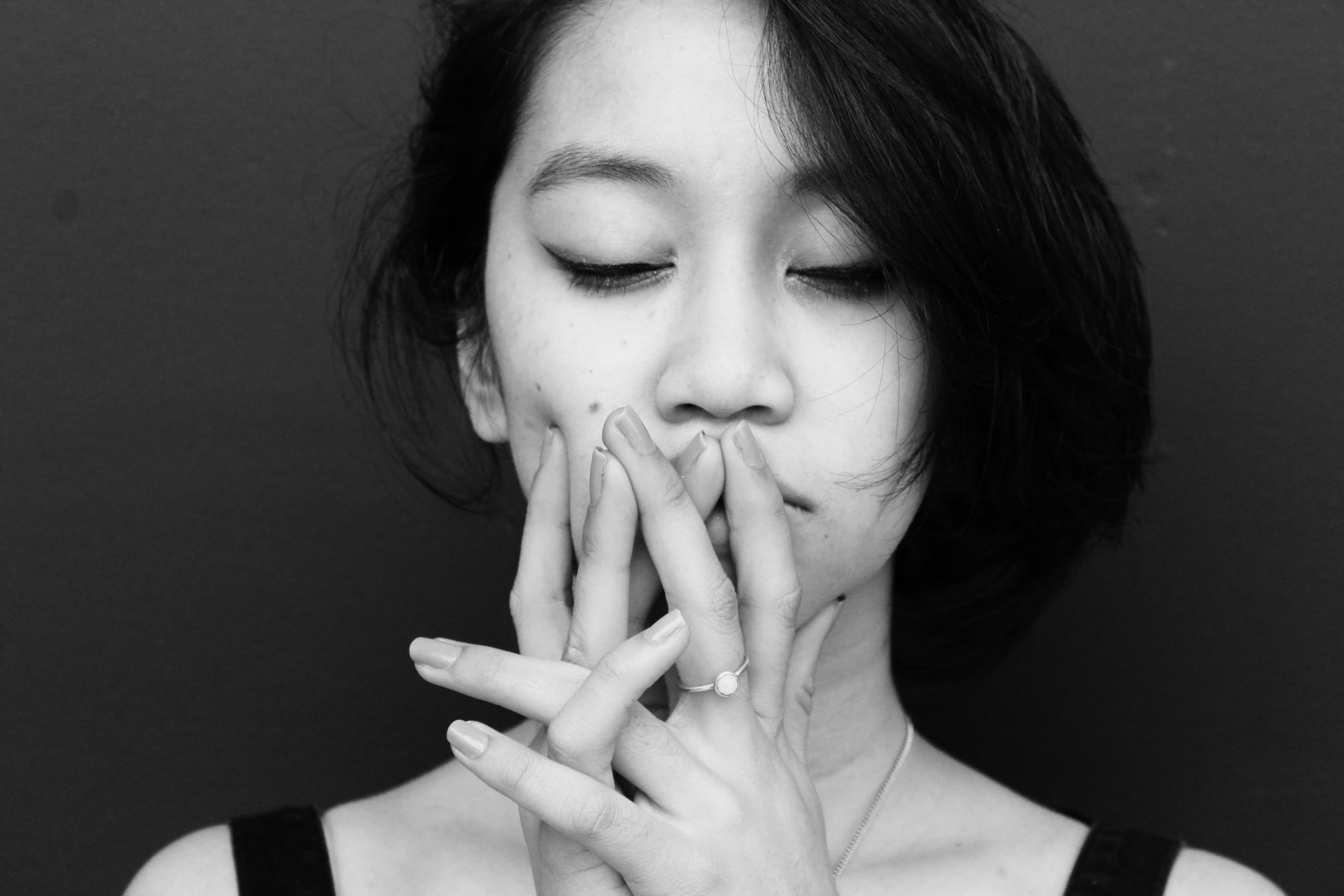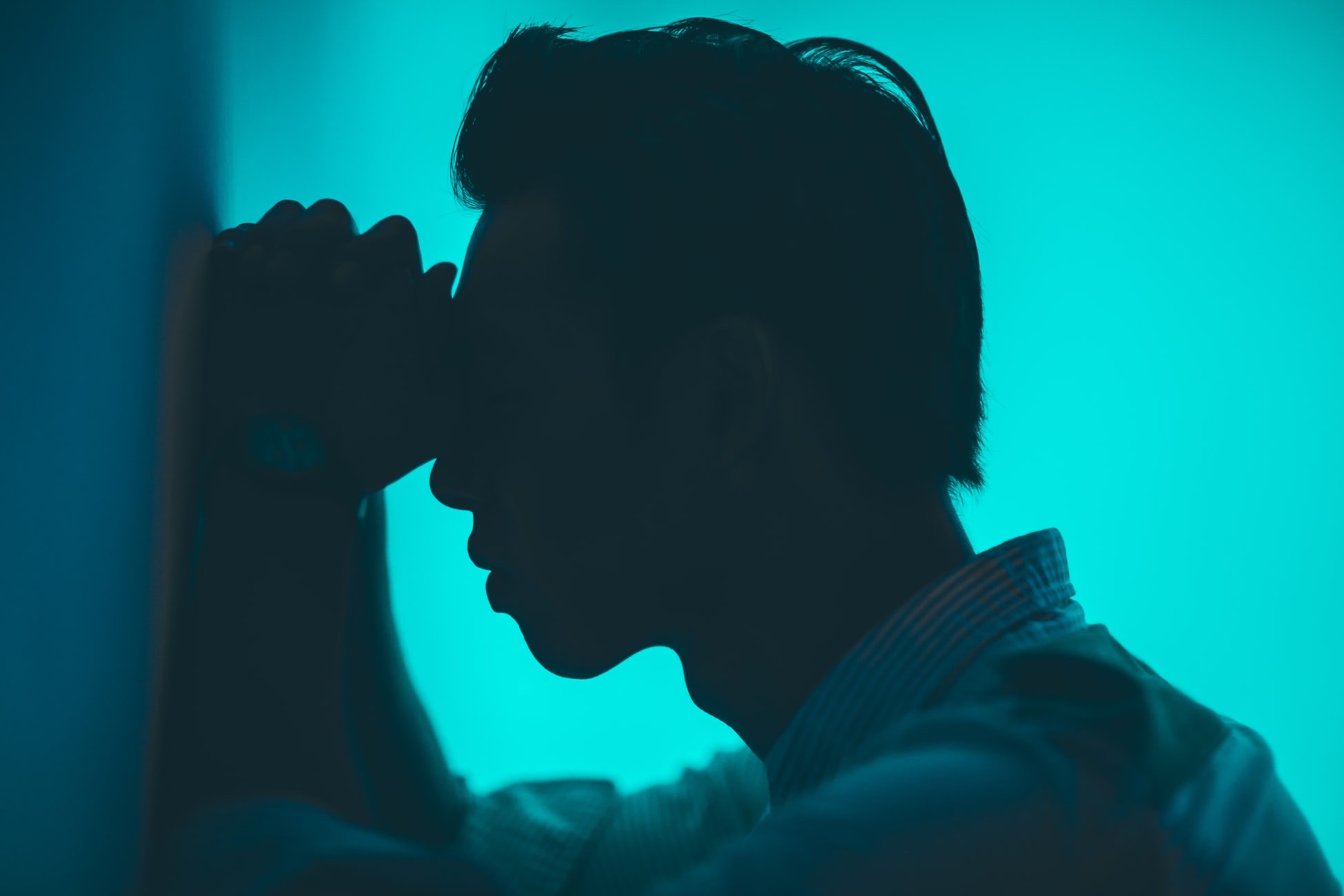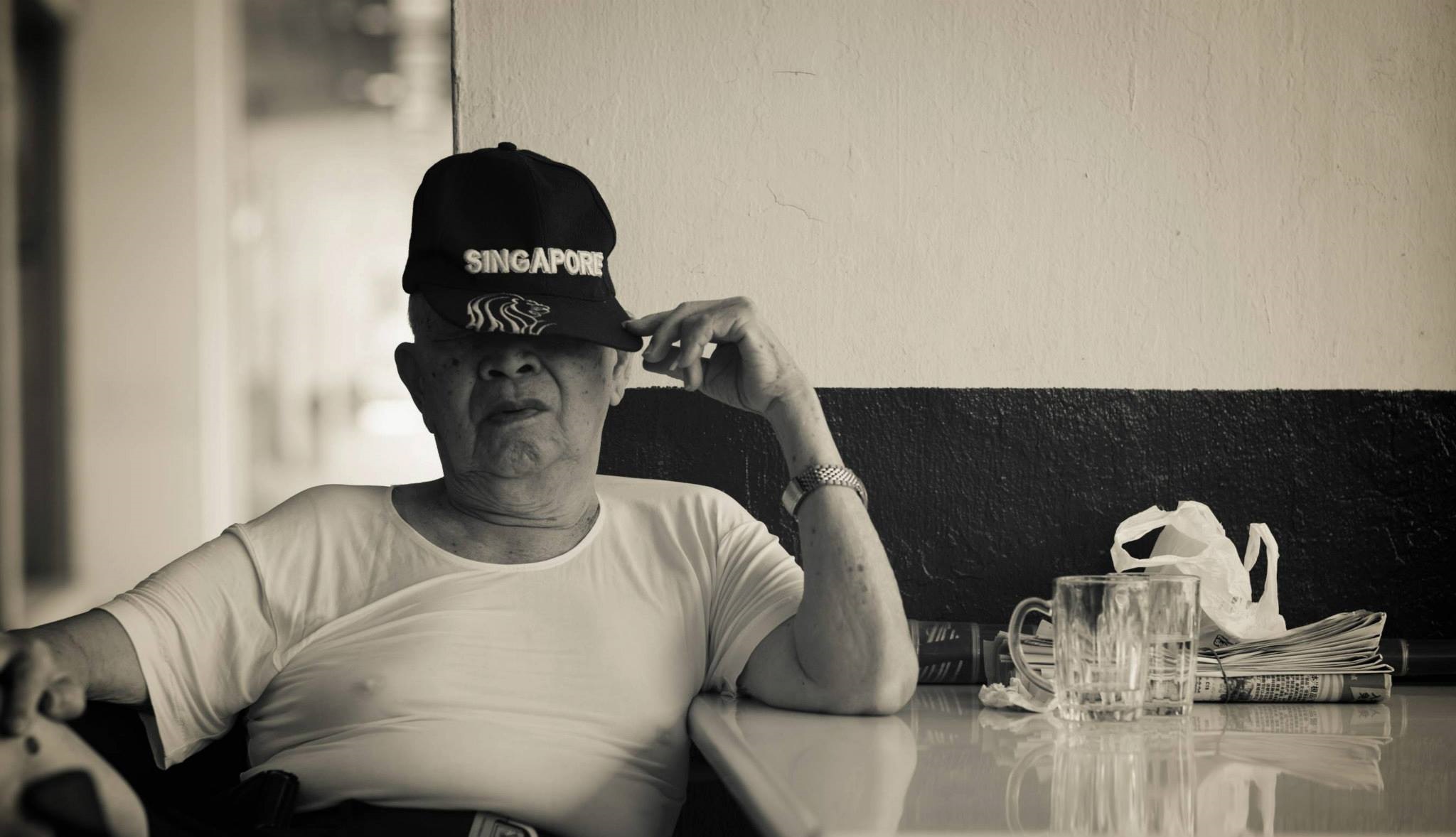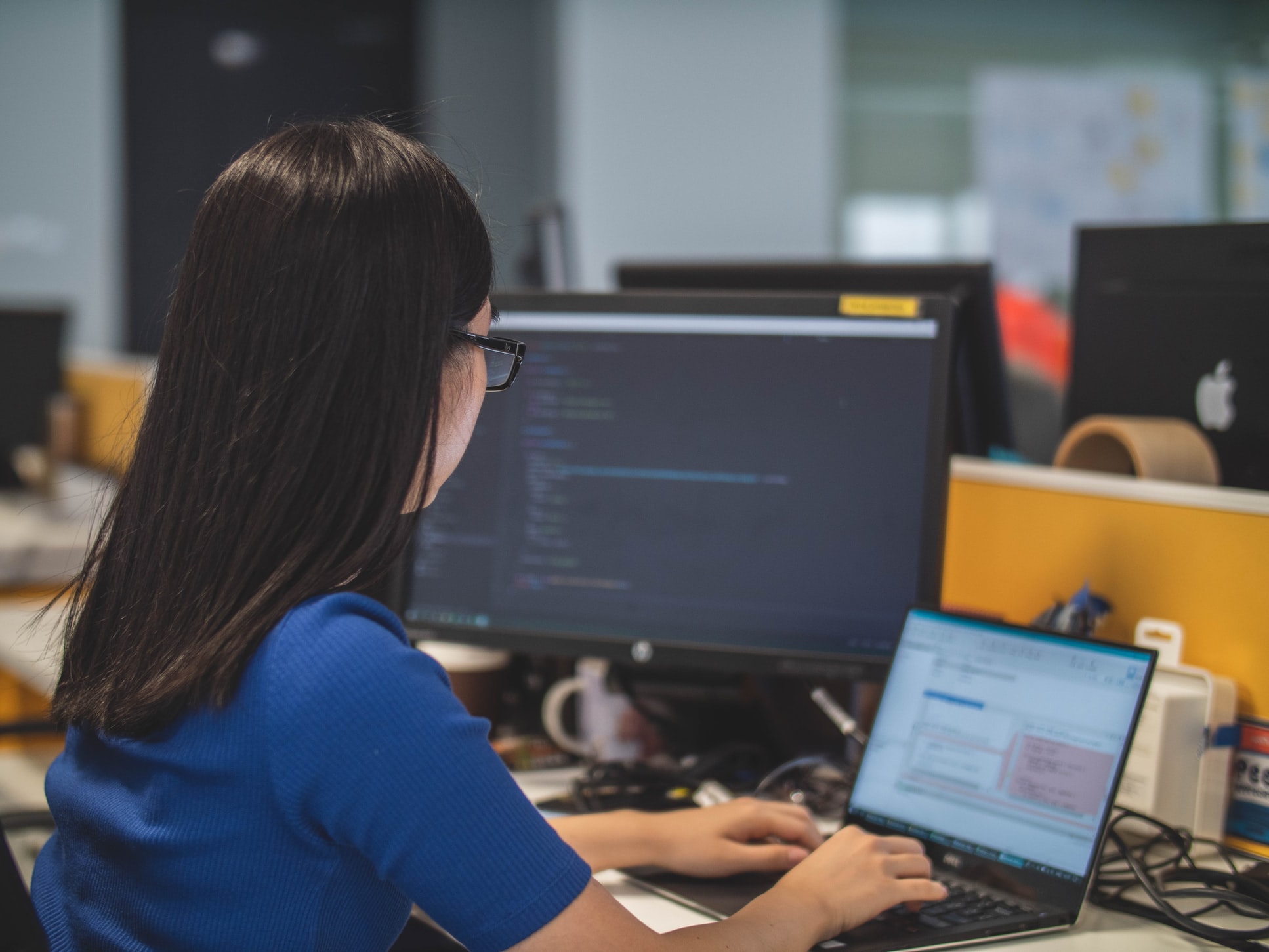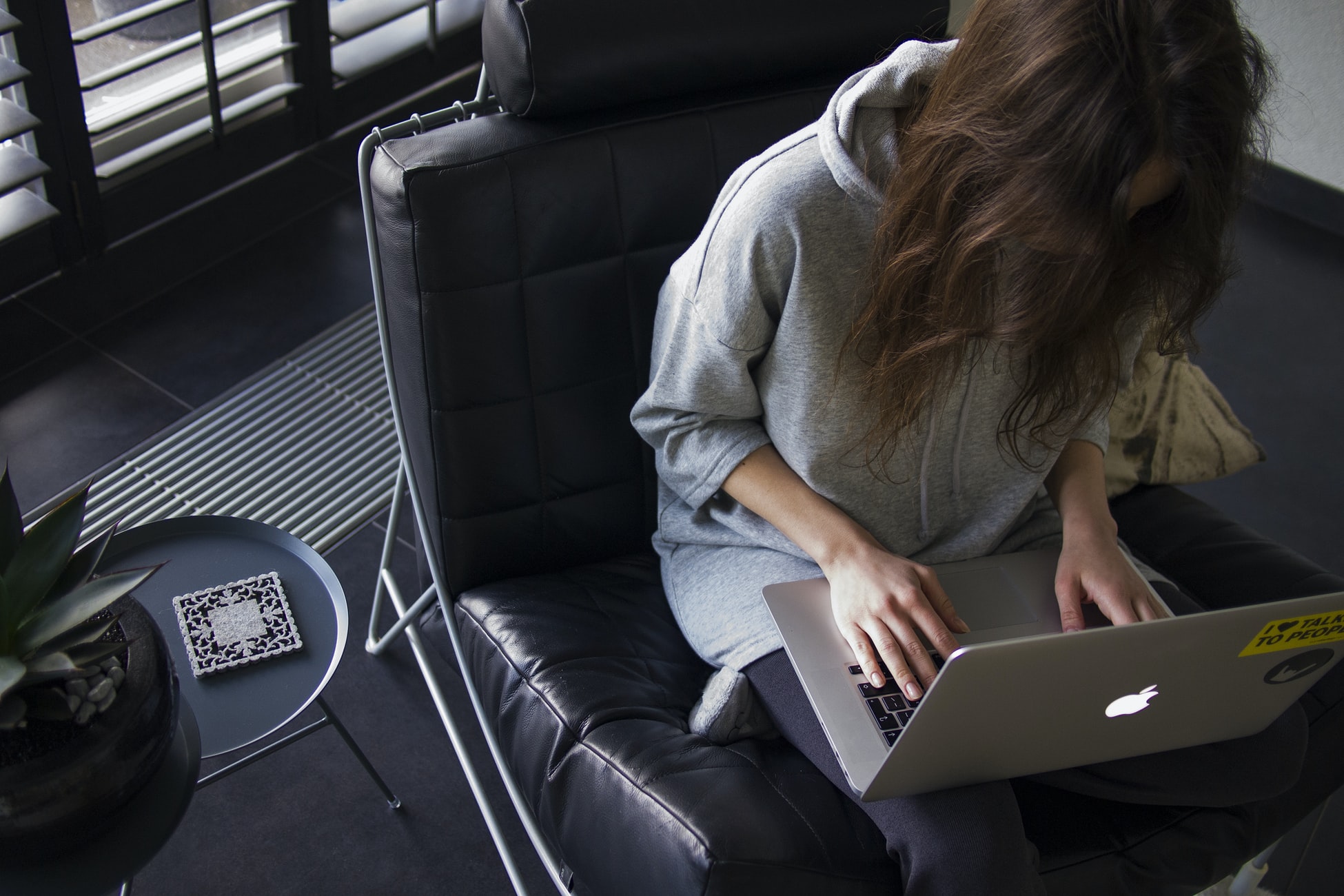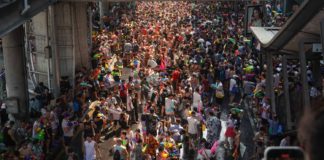Millennials More Likely To Say They’re Not Mentally Resilient: Survey
We all know that the Covid-19 pandemic has hit workers, businesses and Singapore’s economy hard, but it’s also taken a toll on people’s mental health.
Now, 2 surveys based on mental health conducted during the ‘Circuit Breaker’ has found out just how much the virus has affected Singaporeans.
One of the key findings is that millennials aren’t coping with the pandemic as well as older people.
Survey on mental health resilience
The Mental Health Resilience survey was conducted by the National University Health System’s (NUHS’) Mind Science Centre (MSC), and 1,849 people were interviewed.
Those interviewed comprised Singaporeans sectioned by age and background, including students, working adults, non-working adults and retirees.
It asked respondents to describe their mental state amid the pandemic: whether they think they’re coping well and if they think they can bounce back easily from any setbacks.
Younger S’poreans more likely to say they’re not resilient
The survey found that younger Singaporeans – defined as below 45 years old – are more likely to say they’re not mentally resilient.
For example, 60% of younger Singaporeans said they’re unable to handle unpleasant emotions like sadness, fear and anger.
However, only 50% of older Singaporeans – defined as aged 45 and above – said the same thing.
When asked whether they can stay calm in difficult situations, only 39% of younger Singaporeans said yes, while 47% of older Singaporeans said yes.
Moreover, the older the respondent was, the more likely they will say that they’re mentally resilient.
Take a look at this graphic to see the responses to other questions that the survey asked:

Graphic courtesy of NUHS
1st crisis millennials had to face head-on
One millennial interviewed agrees that younger Singaporeans may be more anxious due to the pandemic.
Mr Jermaine Wong, 27, a banking analyst, said Covid-19 in the “1st-ever crisis (his) generation has to face head-on”.
During the 9/11 attacks and the severe acute respiratory syndrome (SARS) crisis, millennials were perhaps too young to be directly involved.
Mr Wong also thinks that one of the worries that millennials might have is that career advancement opportunities may be curtailed, at least in the short term.
However, he’s actually optimistic that the economy will recover in the longer term.
Retirees seem to be the most carefree
On the other end of the scale, those who are retired seem to be the most carefree of all, contrary to belief that seniors may not be able to cope with Covid-19 measures.
They rated themselves as the most mentally resilient, followed by working adults.
56% of retirees said they could handle unpleasant emotions. That’s compared with 45% of working adults, 36% of students and just 30% of non-working adults.
A whopping 64% of retirees said they could solve problems in their life. 54% of working adults, 46% of non-working adults and 40% of students said so.
On whether they can stay calm in difficult situations, 44% of retirees said yes, closely followed by 43% of working adults. However, only 32% of non-working adults and 31% of students said yes.
Fewer retirees have anxious thoughts
Retirees are also less concerned that something bad would happen to themselves or their loved ones, with just 20% feeling anxious over such a possibility. However, such worries plague 52% of students, 50% of non-working adults and 46% of working adults.
Most retired people don’t think about things that they cannot change, which probably includes Covid-19 — just 15% have such thoughts.
That’s compared with 52% of students, 44% of non-working adults and 38% of working adults.
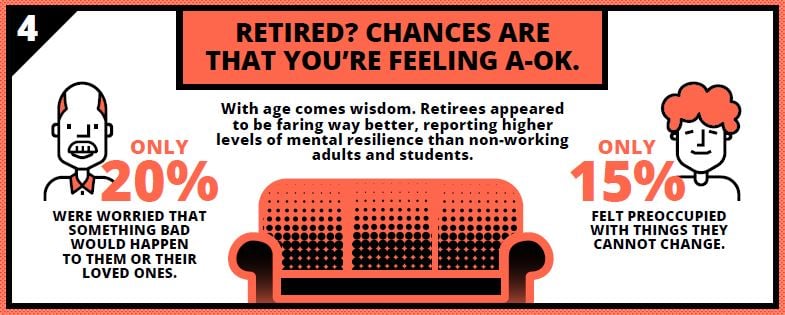 Graphic courtesy of NUHS
Graphic courtesy of NUHS
Older generation has weathered many crises
A retiree that was interviewed definitely agrees that those of the older generation are more resilient when it comes to Covid-19.
Madam Lily Phua, 61, a retiree, says that her generation has “weathered through many crises in the past and emerged stronger”.
She credits seniors’ calmness during crisis to “good habits” cultivated over the years, including practising mindfulness.
She keeps herself busy by managing her household, being a member of the Toastmasters Club of Singapore and volunteering as a trainer at the MSC’s Age Well Everyday programme.
Compared with younger Singaporeans, Mdm Phua also says seniors don’t need material comforts like retail therapy and bubble tea to survive.
In fact, she was shocked to see young people queuing up for BBT the night before BBT stalls had to close during the ‘Circuit Breaker’,
I also feel it is because we were brought up with a lot less, so we need lesser to survive… for older folks like me, we have no problem with just plain water!
Women more affected by pandemic than men
The survey also highlighted a gender disparity when it comes to handling the stresses caused by the pandemic.
Women are less likely to think they’re mentally resilient, compared with men.
Just 38% of women say they can stay calm in difficult situations, compared with 47% of men.
Also, 50% of women say they’re confident of solving life problems, but 57% of men stay the same thing.
Greater disparity between working women & men
When work is thrown into the equation, the disparity between genders is slightly greater.
39% of working women say they can stay calm in difficult situations, but 50% of working men said the same thing — a disparity of 11 percentage points, compared with the 9-percentage-point disparity when the genders are taken in totality.
52% of working women say they’re confident of solving life problems, compared with 59% of working men.
Survey on workplace resilience
Speaking of work, MSC also conducted a Workplace Resilience survey with 1,407 Singaporeans.
114 of these were frontline workers and 1,074 were working from home amid the Covid-19 pandemic.
It asked respondents how they dealt with work stress and working from home.
Women who work from home the most stressed
Again, women got the short end of the stick.
61.3% of women said they were stressed at work, and 50.2% said they were stressed at home.
That’s compared with 49.7% of men who said they were stressed at work, and 45.5% of men who said they were stressed at home.
Women who worked from home were the most stressed, with 63.8% saying so, compared with 52.5% of men who worked from home.
Check out the following NUHS graphic to see more of what the survey discovered:

Graphic courtesy of NUHS
Work-from-home mothers bear the brunt of it
A woman who has been working from home since the ‘Circuit Breaker’ explained why she has been more stressed since she started working from home.
Madam Leong Lye Yin, 45, a project manager in the IT industry, has 2 children aged 11 and 5 years old.
She said that while she was working from home, her son was also under Home-Based Learning.
As her boss expects “the same level of productivity” from her at home, she’s been busy managing her her own work projects, helping her son with schoolwork and keeping her young daughter occupied at home.
Husband isn’t of much help
How about her husband, some may wonder.
Mdm Leong said her husband works from home sometimes, but also goes back to the office sometimes, and helps out when he can.
However, he doesn’t seem to be of that much help, as she said,
I feel that men are less detail-oriented, so the kids still come to me for the little things which can add up to a lot of time!
Working from home more stressful even when children in school
She’s relieved that her children are both back in school during Phase 2, but work is still more stressful than before.
She says working from home actually means that she gets work messages at all times of the day.
Thus, she has to make a conscious effort to set clear boundaries between work hours and family time, she said.
More working from home feel stressed compared with frontliners
Mdm Leong’s experiece of working from home may explain why a majority of those working from home reported feeling stressed.
In fact, more work-from-home staff felt stressed than frontline staff, according to the survey.
61% of work-from-home staff have said they were stressed at work, while 51% of them said they were stressed at home.
However, 53% of frontline staff said they were stressed at work, and just 32% were stressed at home.
Perhaps bringing your work home also brings stress back home? Who would’ve thought that?
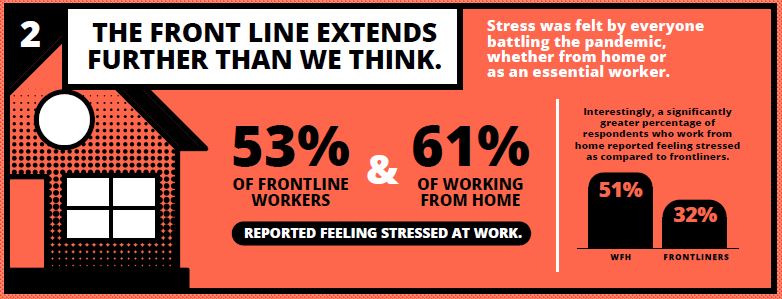
Graphic courtesy of NUHS
Mental health impact worse on some S’poreans
MSC director John Wong, who was lead clinician for the 2 surveys, pointed to 3 factors that may add to Singaporeans’ anxiety amid the pandemic:
- Social isolation
- Uncertainty about how long the pandemic will last
- Worries over the economic fallout
Not all Singaporeans will feel the impact in the same way, he said, adding that,
The impact on mental health is more keenly felt by certain segments of the population; particularly youths, working women and those working from home.
Prof Wong also said the surveys aim to make Singaporeans from each demographic profile more aware of their level of mental resilience, so they can seek help when necessary.
The survey results will also help in formulating intervention programmes to support Singaporeans as we all adjust to a new normal.
Mental health issues are important too
Mental health issues are a topic that doesn’t get as much attention in Singapore compared with economic issues.
But they’re no less important, as they deal with our citizens and their welfare, and will affect the nation’s ability to survive the Covid-19 crisis.
Now that we know who among us will be more affected, perhaps society can also be more understanding to these Singaporeans.
Even if you’re not affected as much by the pandemic, try to be there for your fellow Singaporeans.
Featured image adapted from TheSmartLocal.

Drop us your email so you won't miss the latest news.

